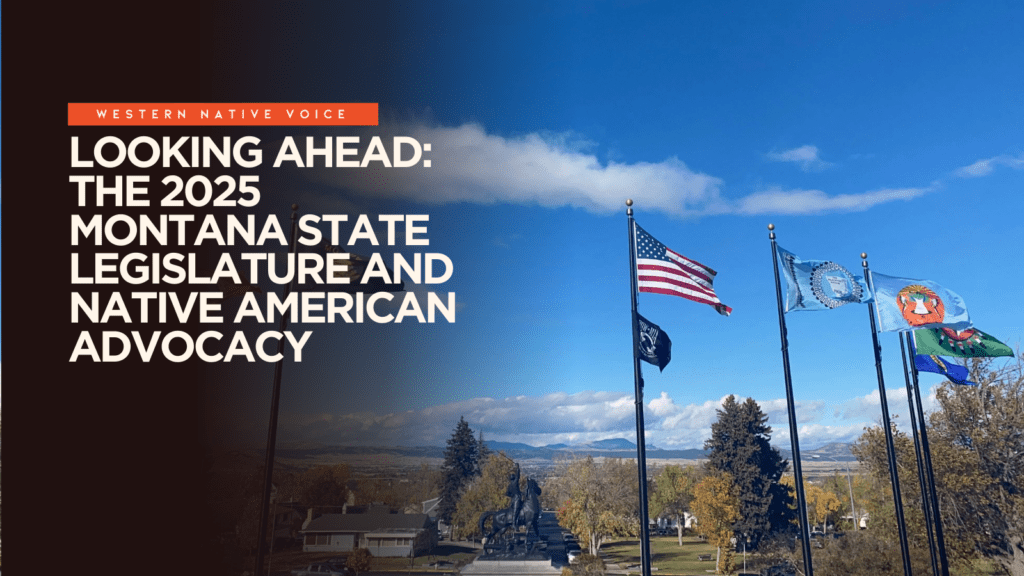
MONTANA—As the state prepares for the 2025 legislative session, attention is turning to the key issues that will affect Native communities across the state. Advocacy groups, including Western Native Voice, are already laying the groundwork to ensure that Native American voices are heard and that the legislative process remains accessible to all Native people.
At Western Native Voice, the organization’s four key programs—education, civic engagement, leadership development, and public advocacy—are essential to advocating for Native communities and ensuring the legislature addresses their needs. Education provides communities with the tools to navigate the legislative process, while civic engagement encourages participation beyond Election Day. These efforts help make the legislative process more accessible and transparent to Native people.
Through programs like the Youth Summer Academy, leadership development trains the next generation of Native leaders to advocate for their communities. Public advocacy ensures that Native communities remain at the forefront of critical issues, including healthcare, Missing and Murdered Indigenous People (MMIP), reproductive health, and tribal sovereignty.
Western Native Voice recently surveyed its members to determine the top priorities heading into the 2025 legislative session. The results revealed strong support for several key issues, including justice system reform. Seventy percent of respondents support automatic voter registration, and 87% favor same-day voter registration. The survey also revealed widespread concern about the justice system, with many viewing it as unfair. The top three issues identified by members were healthcare, MMIP, and reproductive health.
A Western Native Voice staffer commented, “Our members are demanding action on issues that directly impact Native communities. From healthcare to the justice system, these concerns cannot be ignored. It’s crucial that we hold our elected representatives accountable and ensure they are working for the betterment of Native people, not just during election time but throughout their terms in office.”
The 2025 legislative session provides an opportunity for lawmakers to address these pressing issues. Western Native Voice is committed to ensuring that Native communities are not only represented but that their voices are heard in a way that leads to real, substantive change. By engaging with lawmakers and holding them accountable, Western Native Voice will continue to advocate for policies that promote healthcare access, address the MMIP crisis, improve reproductive health, and protect tribal sovereignty.
A key issue that continues to demand attention is Medicaid expansion and its importance to Native communities and healthcare facilities, which rely on Medicaid funding to operate. Expanding Medicaid would provide much-needed support to healthcare providers who serve Native populations, ensuring access to vital services that are critical for the health and well-being of Native individuals and families.
As Montana’s Native communities move forward in advocating for fair representation and equitable policies, Western Native Voice remains committed to making the state legislature a place where Native voices are not just heard but are influential in shaping the future of the state.
One way to become involved in the upcoming legislative session is by answering calls to action. You can start by attending meetings, testifying at hearings, or emailing your representatives to express your concerns and priorities. Every voice matters, and by staying engaged, Native communities can ensure that their issues are front and center as lawmakers make critical decisions.
The 2024 election saw 10 new Native American representatives elected to Montana’s state House and Senate, including Sen. Jonathan Windy Boy, Sen. Jacinda Morigeau, Rep. Thedis Crowe, Rep. Tyson Running Wolf, Rep. Frank Smith, Rep. Mike Fox, Rep. Jade Sooktis, Rep. Shelly Fyant, Rep. Donavon Hawk, and Rep. Sidney Fitzpatrick. They will join Senator Susan Webber and Senator Shane Morigeau, bringing the total number of Native American representatives to 12. While this marks a significant step forward, it also highlights the need to hold these leaders accountable to their communities.






